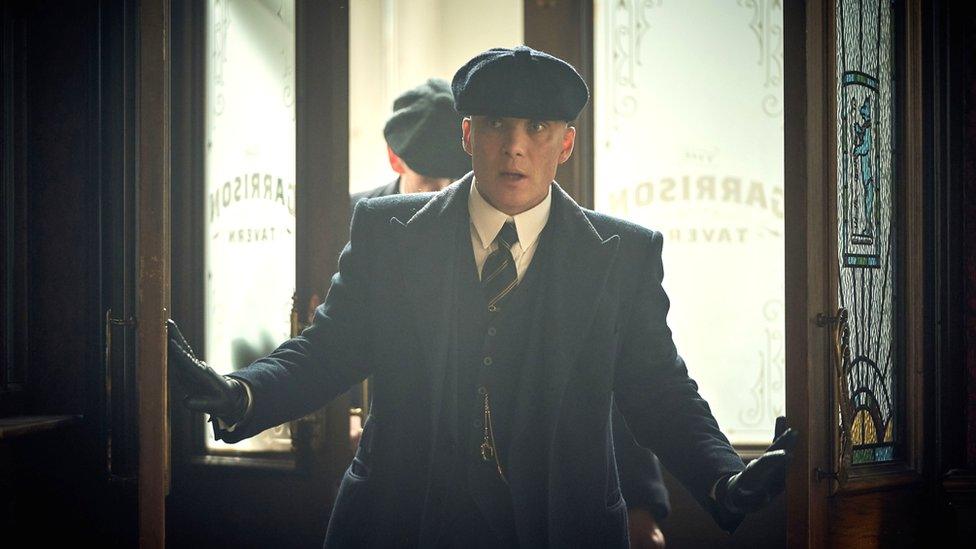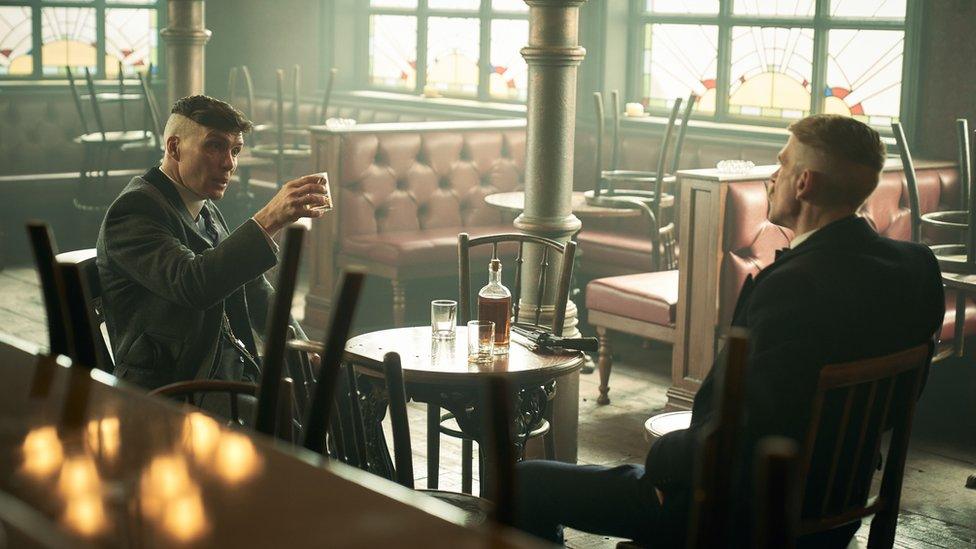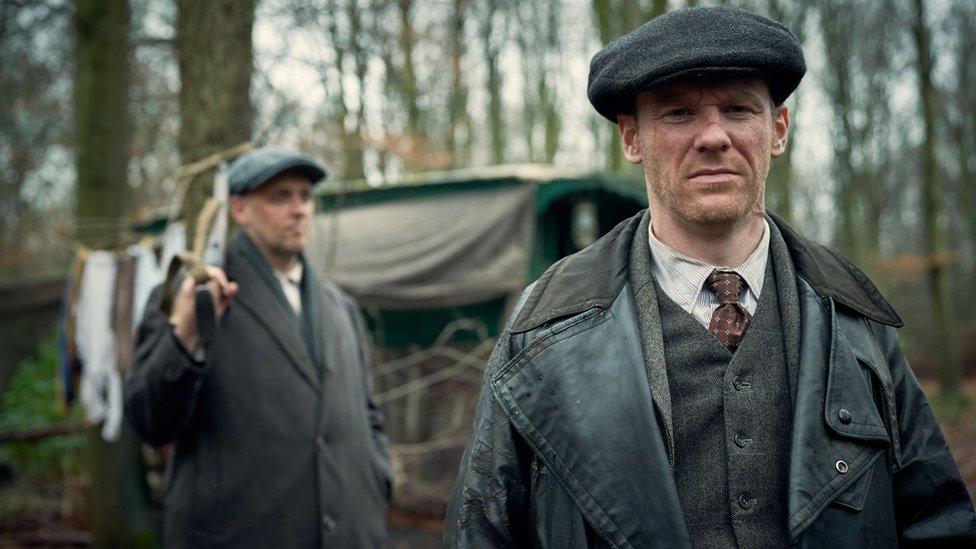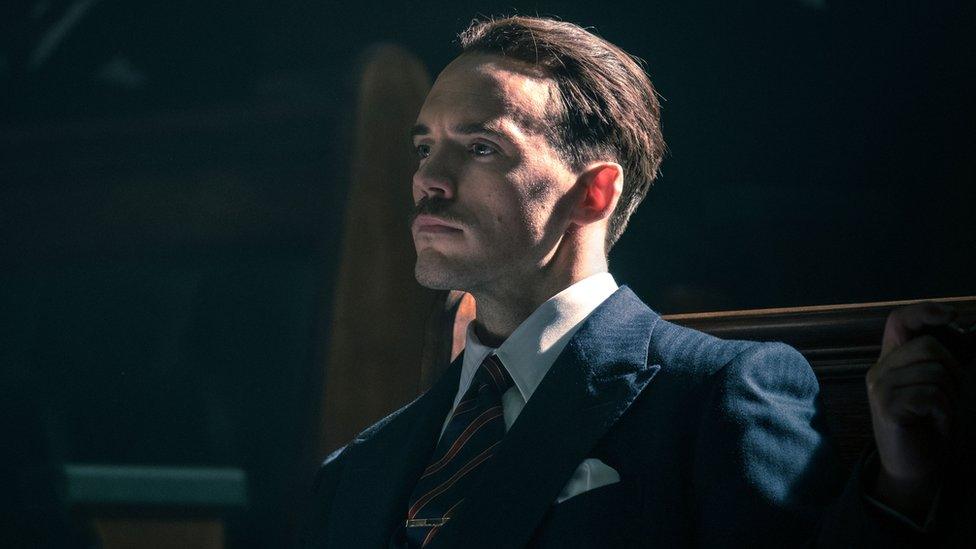Peaky Blinders: Who were the real Billy Boys?
- Published

Tommy Shelby has been sent a warning by Glasgow gang the Billy Boys
The fifth series of Peaky Blinders has seen the arrival of the Billy Boys from Glasgow.
The gang sent a gory warning to Tommy Shelby (played by Cillian Murphy) and his family as they made their mark on the BBC TV series, which is set in 1920s Birmingham.
Who were the real Billy Boys?

Peaky Blinders is set in Birmingham in the late 1920s
Like Birmingham, Glasgow was famous for its razor gangs.
Author Robert Jeffrey told BBC Scotland the two main gangs in the 1930s were the Billy Boys and the Norman Conks.
"It was a religious divide," he said.
"The Billy Boys were protestants and the Conks, who centred on Norman Street, were Catholics."
Mr Jeffrey said the main aim of the Billy Boys was to terrify the Catholic population, who were mainly Irish immigrants, and make them feel as unwelcome as possible.
Their name came from William of Orange (King Billy), whose victory at the Battle of the Boyne in 1690 secured Protestant rule in England and Scotland, as well as Ireland.
The Billy Boys came from an area to the east of Glasgow city centre called Bridgeton, or Brigton as it was known.
The staunchly protestant gang was initially set up to fight against Irish immigrants but as well as the rampant sectarianism, the gang ran the entire neighbourhood, operating illegal scams, protection rackets and providing "stewards" for political meetings and open-air boxing bouts.
Who was their leader?

In the TV show the Billy Boys are led by Jimmy McCavern (Brian Gleeson)
The gang took their orders from Billy Fullerton.
Former journalist Mr Jeffrey, who has written a number of books on Glasgow's gangs, said: "Like in gangster films and TV shows, such as Peaky Blinders, you needed someone at the top who has got to have the guts and the respect and carry the troops with him."
Fullerton always claimed he had been attacked by a gang of Irish Catholic immigrants after performing well in a football match against their team.
He regularly gave overtly sectarian speeches which aimed to inflame feelings against immigrants.
According to Mr Jeffrey, Fullerton created a well-organised unit.
"It was so disciplined, it was like a private army," he said.
Mr Jeffrey said that at a time when there was mass unemployment, being with Fullerton and his gang gave the young men a sense of power.
The Billy Boys took a lead role in activities such as church parades and religious processions but they used them as an opportunity to march through Catholic areas goading and abusing them.

British fascist leader Oswald Mosley is played by Sam Claflin in the series
They had a flute band and their own songs, including the infamous "Billy Boys", which was sung in the TV show.
"The main aim was to damage the Catholic population and make them feel unwelcome," Mr Jeffrey said.
"They would march up and down Norman Street, where the Conks came from, and sing 'we are the Billy Boys'.
"The intention of that was to terrify the Catholic inhabitants of the area."
With up to 800 young men involved, the police were outnumbered and intimidated.
There were violent skirmishes with other gangs, often involving knives, hammers, broken bottles and chains.
The activities of the gangs continued throughout the 1930s despite the crackdown from new police chief Percy Sillitoe, who waged war on their activities.
In the run-up to World War Two, Fullerton and the Billy Boys became involved with Oswald Mosley's fascists, providing a bodyguard for their meetings.
The war, as well as the police crackdown, brought that chapter of Glasgow's gang culture to an end.
Fullerton died in 1962 at the age of 56.